What is Bitcoin and should you buy any?

by Owen Burek in Budgeting & Banking, Make Money
Updated 30 October 2021 ShareTweet
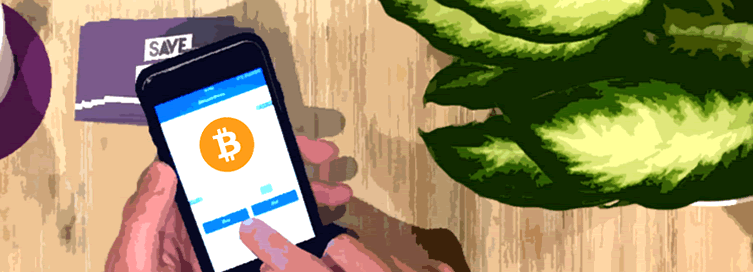
Bitcoin and cryptocurrency is everywhere these days, but very few understand how it works and whether Bitcoin is safe. Before you buy Bitcoin there are some key things to consider.
Before we start, it’s important to be clear that this is an educational guide to understand Bitcoin, not investment advice. I wrote this guide in response to growing questions about Bitcoin and hearing about costly mistakes from some who attempted to buy Bitcoin via unreputable platforms. I bought some Bitcoin to really understand both how it works and how to buy Bitcoin safely.
In 2013 I set out to buy one whole Bitcoin for £200. But it never actually happened.
The closer I got to buying, the more confused and worried about the whole thing I got. So I gave up.
I wasn’t to know, but if I’d persevered, that Bitcoin would now be worth over £30,000.
With the ongoing surge in interest and media coverage, the conversation gets louder and louder, and so much harder to ignore. The price of Bitcoin has risen quickly over recent years.

Bitcoin could have huge implications for everyone’s future. I felt it was time to try buying Bitcoin again. Not to make money, but to understand what the hell all the fuss was about.
The itch led me down a rabbit hole of research, fueled by fascination and excitement. I finally ‘got it’. It also became obvious that today it’s far easier to buy Bitcoin than it used to be.
Today I’m the proud owner of 0.01603666 BTC, which I exchanged for £100.
In this guide, I take you through the exact steps I followed to buy Bitcoin. The process itself took about 15 minutes.
But before we get to the tutorial steps of how to buy Bitcoin safely, it’s really important to know what we’re getting into. Increasingly I hear from students making mistakes due to rushing into Bitcoin investing because of all the hype. There’s so much fragmented or misleading information out there. My aim here is to cut through the noise with a simple and concise explanation of how Bitcoin works before walking through the buying process I used.
What is Bitcoin?
To many people, Bitcoin represents the future of paying for something, as a new digital global ‘cryptocurrency’. Rather than using a £1 coin or $1 bill, something could be 1 Bitcoin (1 BTC).
But Bitcoin is much more than a currency, and this is why people often get confused. It’s also the entire network (known as a Blockchain) that securely oversees the entire process of someone sending money to someone else.
Say you spend £20 at a restaurant on a Visa debit card. That transaction must be processed through a card machine, Visa, your bank and the merchant bank. At each step, communication and verification takes place.
Bitcoin’s promise is to remove all of this friction involved in the verification, whilst also making payments much more secure. You could use your mobile phone to send £20 worth of Bitcoin to the restaurant directly.
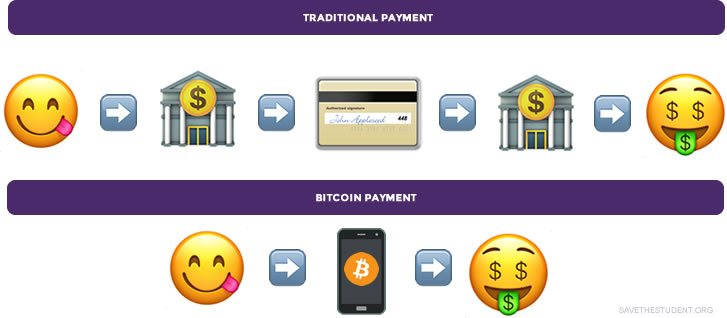
By cutting out the middlemen, transactions become much cheaper too, especially when it comes to international payments.
Bitcoin also takes on the role of government central banks (eg. The Bank of England). Governments traditionally have control over the supply of currency which is open to manipulation and corruption.
The Bitcoin Blockchain is completely open. It isn’t owned or controlled by anyone, it’s run by a network of many computers around the world.
Of course the young cryptocurrency is not without its critics. Mainstream media, traditional banks and financial commentators all warn against a ‘bubble’ set to burst, and the opportunity for the Bitcoin network to be used by criminals.
13 key things to know about Bitcoin
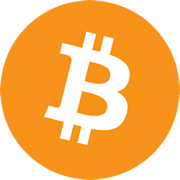
As a total novice, I spent days researching the ins and outs of Bitcoin, its benefits and risks. Here’s my distilled list of the key points.
- Trust – Bitcoin fills the ‘trust gap’ between two parties (currently the role of banks)
- Secure – Transactions are encrypted within a Blockchain which is impossible to hack
- Decentralised – With no one body in control, it can’t be taken down, hacked or manipulated
- Unregulated – There’s no guarantee of protection if a payment is made in error
- Transparent – Both code and all BTC transactions (imagine knowing where every tax penny went)
- Low cost – Removes institutions and friction, especially for international payments
- Speed – Complete digital network
- Limited supply – Capped at 21 million Bitcoins
- Truly global – Doesn’t geographically exclude people
- Privacy – Institutions don’t hold your data
- Virtual – Despite its name, Bitcoin has no physical coins. All 1s and 0s
- Volatile – Bitcoin value still fluctuates wildly (don’t see it as a short-time investment)
- Energy intensive – Bitcoin mining has a massive carbon footprint
Ultimately Bitcoin promises to democratise money, whilst removing almost all of the friction and cost in making a secure payment.
You don’t need to understand everything to buy Bitcoin.
Under the bonnet Bitcoin is an incredibly complex technology, which makes it so secure. Most people don’t really know how card machines or even the internet works but still use them every day.
We’ll dig deeper into the background and implications of Bitcoin later if you’re keen to learn more.
Should you buy Bitcoin?

Firstly, you don’t need to buy a full Bitcoin. That would be pretty expensive now! A Bitcoin can be divided all the way down to one hundred millionths. You can buy BTC for as little as £5 if you wish.
If you can’t spare £5 or are in debt please don’t buy Bitcoin as you could lose money.
There are 3 types of people buying Bitcoin:
- Speculators – the value has risen massively, but it’s still very volatile making Bitcoin a risky investment
- Actual users – what it’s all for! Spending and even earning in Bitcoin is slowly gaining traction
- The curious – Bitcoin’s an exciting new technology, and many want to just understand the future of money and be part of the conversation.
Everyone has their own motivations when it comes to buying and selling Bitcoin, but the purpose of this guide is for the third type. I bought a small amount of Bitcoin myself to understand and appreciate this new technology and the opportunities it brings.
Once you actually give it a go by buying and sending some Bitcoin, it becomes a whole lot simpler to understand!
I believe everyone would benefit by buying a tiny bit of Bitcoin just to educate themselves on the digital currency, which could quickly become part of our future.
I do think Bitcoin is the first cryptocurrency that has the potential to do something like change the world – Peter Thiel, Co-Founder of PayPal
Bitcoin’s carbon footprint
Another important consideration is the large carbon footprint of Bitcoin mining. Much of it is carried out by thousands of supercomputers in China still powered by fossil fuels.
When I bought Bitcoin several years ago the energy required was far less than it is today. Hopefully there will be a shift to renewable energy very soon and once all Bitcoin has been mined the footprint will come down.
Given what we know today, if you are as concerned about climate change as I am, I suggest only buying a small amount of Bitcoin, if any.
How to buy Bitcoin tutorial
I’m going to walk you through the exact steps I took to buy Bitcoin. I bought some for the sole purpose of going through the motions.
There are plenty of other (potentially questionable) methods and websites where you can buy cyrptocurrency – which could be slightly cheaper – but this was all about minimising risk and complication for myself as a total newbie.
You need just 5 things before buying Bitcoin:
- Bitcoin address – A string of numbers unique to you, that allows you to receive Bitcoin (acts like a bank account number). Also known as a ‘public key’.
- Bitcoin wallet – A secure place to store your Bitcoin (acts like a bank account).
- Bitcoin exchange – A website to convert old-school cash into Bitcoin (acts like a bureau de change).
- Payment method – A debit or credit card to buy Bitcoin.
- Form of identity – You’ll need your passport or driver’s license to hand.
7 steps to buying Bitcoin
After some lengthy research, I decided on using Coinbase as a ‘one stop shop’. They set me up with an address, a BTC digital wallet and the conversion of money to Bitcoin itself.

I also like their intuitive website and mobile app, which allows me to send and receive Bitcoin on the move. The whole Bitcoin buying process outlined below took me less than 15 minutes.
- Create an accountClick here for a special promotion where you will receive £10 worth of Bitcoin for free after verifying your new account.Complete the short form and create your Coinbase account.
- Verify your emailHead to your inbox and click the verification link. It may take a few minutes to arrive (check junk folder if longer).
- Connect your phoneTo secure your account, you’ll now be asked to link up your mobile phone.This is known as two-step verification and means no one can access your account without knowing your password and holding your phone.Coinbase will immediately send you an SMS with a code. Enter this in the box, and your account’s created and secured.
- Verify your identityTo follow financial regulations Coinbase need to verify your identity, and this is the next page you’ll see.Enter your personal details and on the next step select an ID type for which you’ll need to upload a photo.Similarly, you’ll then need to do the same for proof of address.The live verification check only takes a minute or so. Once complete you’ll be taken to your Coinbase dashboard.
- Add a payment methodOn the Coinbase dashboard, scroll down and now click “Add a payment method” (or go to Settings).For the purposes of this tutorial, I suggest using a debit card. This allows you to buy Bitcoin instantly for a small fee. Bank transfer is an option but can take several days to set up.Run through the card authentication process and now you’re ready to buy your first Bitcoin.
- Buy BitcoinClick “Buy/Sell” in the top menu.Ensure “Bitcoin” is selected and your payment method should be pre-loaded.Enter in the amount of money (or Bitcoin) you wish to buy. I bought £100 but it could be as little as £5 (£76 is needed for the £7 signup bonus).Click “Preview Buy” to see the conversion and the full transaction, including the fees.Click “Buy now” and the Bitcoin will be added to your wallet immediately. Congrats!In my example, I purchased £100 with total Coinbase fees of £3.41. The remaining £96.59 bought me 0.01603666 Bitcoin.
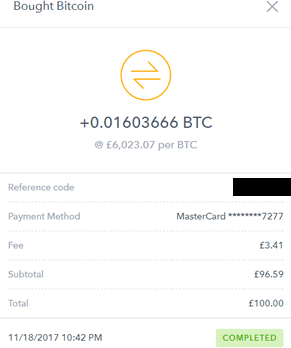
- Check your Bitcoin digital walletClick “Portfolio” in the side menu.Against “Bitcoin” you should now see your owned Bitcoin amount.
How to send and receive Bitcoin
Now that you know how to buy Bitcoin, you may like to try using it. Sending and receiving Bitcoin is all managed from your Coinbase account too.
To receive Bitcoin from someone else, they just need your unique Bitcoin address. You can find yours by clicking the “Send/Receive” button and then “Receive”. It’s also in a QR format that’s more convenient for mobile phones.
To send Bitcoin, there are a couple more steps:
- Click the “Send/Receive” button
- Enter the amount (to be sent from your digital wallet)
- Enter the BTC address of the receiving person or wallet
- Write a message (acts like a payment reference)
- Click “Continue” to confirm the transaction
If you want to try this right now, make a small donation to the RNLI. Here’s their address.
Download the app to manage Bitcoin
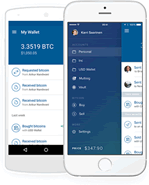
The Coinbase app allows you to access your BTC wallet on the move.
This of course opens up the ability to spend and transfer Bitcoin locally using QR codes, for example in shops or between friends at dinner.
Bitcoin transactions
Remember there is a log of all transactions within your Bitcoin wallet.
Bitcoin transfers are also stored in the publicly available Blockchain, but they’re completely anonymous because there’s no way to associate the addresses with people.
Just for kicks, click here to see an example transaction I sent to a friend’s wallet. Again, don’t worry about understanding it, but we’ll come back to Blockchain technology later in this guide if you’re interested.
What can you buy with Bitcoin?
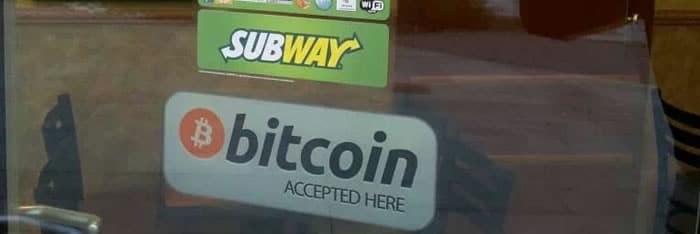
From local London pubs to global retailers, businesses of all sizes are starting to accept Bitcoin as payment.
You can even pay tuition fees at Cumbria University with Bitcoin, and there have been rumours that Amazon will soon be joining the party.
Here are some examples of well-known brands currently accepting Bitcoin as payment:
Where you can spend Bitcoin
- CeX (entertainment)
- Dell (computers)
- Expedia (travel)
- Lush (cosmetics)
- Microsoft (computers)
- RNLI (charity)
- Scan.co.uk (computers)
See our “what you can buy with Bitcoin” guide for more.
Growth of Bitcoin across the UK
You may also be surprised by how many places near you now accept Bitcoin. Click below to see growth in the UK over recent years.
Check out the live Bitcoin map for your area here.Enjoying our Bitcoin guide? Please share it with your friends.
How does Bitcoin work?
Although it is not essential to understand exactly how Bitcoin works to use it, knowledge is power and I personally find it fascinating.
Bitcoin is actually built on a much broader technological advance known as Blockchain.
What is Blockchain?
Blockchain technology is a super-secure way of publicly verifying the transfer of information between two parties.
When a transfer takes place, a block is added to the chain chronologically. Each block contains sets of data relating to the transaction, and also relates to the previous block with a cryptographically generated signature. It’s this signature that locks (or chains) all the blocks together so that a block can never be modified once it’s created.
Seen as a kind of public ledger, a Blockchain is stored in the cloud across thousands of computers around the world. The mix of the chain being decentralised and blocks bound together makes Blockchain technology practically unhackable.
Bitcoin was the first and most popular implementation of Blockchain. When you send some Bitcoin to another person, the transaction will be verified by lots of computers in the Bitcoin Blockchain and create a new block.
You can see a real example of a block here. This is a Bitcoin transaction I made. Note the “Confirmations” icon: 1,814 separate computers have already verified this transaction.
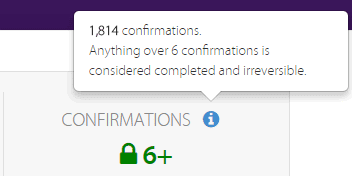
But in fact, any form of transfer that requires validation can utilise the technology, anything from licensing music, sharing medical records to buying a house.
Ethereum is another kind of cryptocurrency that also goes beyond money to handle ‘smart contracts’. This means a legal document such as the transfer of Title Deeds can be quickly validated for a property sale, for example.
Even the British government are being encouraged to adopt Blockchain.
Whilst it’s still early days, some experts predict that Blockchain technology will lead us into a “trust” revolution, following on from the industrial and informational revolutions.
NFTs (non-fungible tokens) are another recent example of how the Blockchain can be used to authenticate ownership of a digital asset and create value.
Where do Bitcoins come from?
New Bitcoin is created as a result of ‘mining’, which is also the way that every Bitcoin transaction is processed and verified.
For every transaction, mining computers must solve very complex mathematical problems and generate a 64 digit solution. Once solved, one block is added to the Bitcoin chain and the miner earns a certain amount of new Bitcoin as a reward.
The Bitcoin Blockchain is programmed to only ever release 21 million Bitcoins. Once they’ve all been mined no more will ever be created.
This gives Bitcoin the benefit of being a deflationary asset, like gold, which tends to increase in value over time due to increased scarcity.
What are the downsides of Bitcoin?
It’s important to remember it’s still early days. All new technology comes with obstacles and trade-offs, just as we’ve seen with the internet and disruptors like Uber.
Some of Bicoin’s disadvantages:
- Mining is increasingly very energy intensive with a large global carbon footprint
- Great amount of price volatility in the short term
- It’s a currency and a commodity, meaning people incentivised to hold rather than spend Bitcoin
- Huge volume of transactions processed slows down verification (whole network upgrades needed)
- No intrinsic value – just what someone else is prepared to pay (like gold)
- No buyer protection
- Used for criminal transactions as it’s untraceable (like cash)
- Not widely accepted yet
- Possibility of governments prohibiting merchants from accepting Bitcoin
- Lots of people working in finance will lose jobs
Why has Bitcoin got so popular?
In 2010 someone bought just two pizzas for 10,000 Bitcoin. Today those pizzas would be over £72 million.
The phenomenal growth follows Bitcoin becoming increasingly accepted, really hitting a tipping point in 2017 as its value surged by more than 880% in 12 months.

Bitcoin had the advantage of being the first cryptocurrency, but there isn’t one specific reason why Bitcoin itself has become so popular.
Various political events have added to the mix since 2009, along with technological advances and media attention.
For example, the European Court and Japan have recently recognised Bitcoin as a real currency, whilst Chinese investors are increasingly keen to move their money away from the control of the Chinese government.
The financial crisis of 2008 undoubtedly also gave Bitcoin a big step up. Big banks revealed their vulnerabilities and many people lost trust in institutions.
Mainstream use of Bitcoin is inevitable
In 1988 The Economist predicted a world currency by 2018. The idea is nothing new!
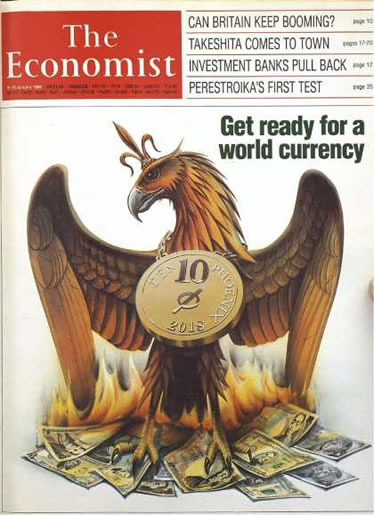
Is something like Bitcoin not just the natural next stage of progression? Bitcoin offers a democratic, digital, fast, secure global currency.
‘Money’ has already gone from grain to metals to paper to electronic (online banking, credit cards, PayPal etc). Perhaps we’re on the cusp of going completely digital, and Bitcoin is taking the lead.
With all the advantages that Bitcoin (and Blockchain) carries – and that only 0.1% of the global population are participating so far – the momentum is likely to continue.
Keep in the loop! Join my ‘new ways to make money’ list
Bitcoin FAQs
Who founded Bitcoin?
This is a Banksy situation – no one knows.
The name used by the founder is Satoshi Nakamoto but this is an alias for an individual or group rather than an actual person. The decision to remain anonymous supports the idea of Bitcoin not being owned by anyone.
Satoshi Nakamoto coded the Bitcoin Blockchain network, but then released it to the world (open source) to ensure no one person has control over Bitcoin.
Where can I buy Bitcoin?
In the tutorial and example above of how to buy Bitcoin, I choose to use Coinbase due to its simplicity and relative security.
There are quite a few other Bitcoin exchanges which have lower fees but can be slightly more complex to use for newbies.
If you are serious about buying Bitcoin beyond the realm of just understanding how it works, you can check out Coinbase Pro (use your Coinbase account to login first).
Where can I sell Bitcoin?
You can usually sell Bitcoin at the same exchanges where you buy it, including Coinbase.
Never sell directly to someone you don’t know outside of an exchange, because if you send the BTC first they could easily disappear without paying you.
What’s the best Bitcoin wallet?
Websites like Coinbase give you an online Bitcoin wallet, which is easy to use and fine to get you started.
However, they still act as a mediator. So if you’re serious about buying and using Bitcoin, you’ll want to get your own BTC wallet that you control and sits on an offline USB stick.
I opted for Ledger Nano S, but you can see others here.
Once installed, I simply sent Bitcoin from my Coinbase wallet to my new Ledger wallet.
Can I invest in Bitcoin without owning any?
There are options to invest in Bitcoin through exchange-traded portfolios. These simply track the price of Bitcoin so you don’t need to worry about securing your wallet.
I personally own Bitcoin and also invest a small amount via the online trading platform eToro. We have a great guide on eToro here and reported about a student who’s had success with cryptocurrencies using the platform.
Disclaimer: Cryptocurrencies can fluctuate widely in prices and are not appropriate for all investors. Trading cryptocurrencies is not supervised by any EU regulatory framework. This guide on buying Bitcoin is not investment advice. You should consider whether you can afford to take the high risk of losing your money.
Is Bitcoin a scam?
Bitcoin is not a scam, it is a legitimate new financial technology already being used by millions of people around the world.
That’s not to say there aren’t scams linked with Bitcoin. Many people let greed get the better of their judgement, don’t do their research and see buying Bitcoin as a get rich quick scheme.
Scammers may advertise fake Bitcoin wallets or exchanges on social media to cash in on the hype and confusion. Always do your research (as I have for this tutorial) and never part with money or personal details unless you are 100% confident.
How is Bitcoin different to PayPal?
Whilst PayPal can be seen as a digital transfer of money, it’s not playing the role of a currency.
They also still act like a bank by mediating payments, with all the transactions centralised and controlled by one company.
Lastly PayPal transactions aren’t encrypted to the same level as Bitcoin, so overall PayPal is more vulnerable to being targeted by hackers.
Interesting Bitcoin resources
- Bitcoin stats
- Bitcoin countdown
- Live Bitcoin transactions
- Bitcoin acceptance map
- Bitcoin ATM map
- Browse Blockchains
- Bitcoin exchange data
- Original Bitcoin whitepaper by “Satoshi Nakamoto”
- Explaining Bitcoin today is like explaining the internet in 1994
TED Talks
- Blockchain: Massively Simplified
- How the blockchain is changing money and business
- The future of money
- How the blockchain will radically transform the economy
If you have used this tutorial on how to buy Bitcoin and found it helpful, please share it with your friends.
HOT DEALS
 Win £250 of ASOS vouchers
Win £250 of ASOS vouchers Branded Surveys – Payout for your opinion
Branded Surveys – Payout for your opinion Get paid for searching the web with Qmee
Get paid for searching the web with Qmee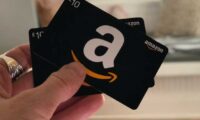 Earn £20 Amazon Vouchers
Earn £20 Amazon Vouchers
TRENDING
 Easy ways to reduce your carbon footprint
Easy ways to reduce your carbon footprint How to save money – 83 money saving tips
How to save money – 83 money saving tips Student Money Survey 2021 – Results
Student Money Survey 2021 – Results How to create a website in 20 minutes
How to create a website in 20 minutes Best paid online survey sites
Best paid online survey sites 40 easy ways to make money quickly
40 easy ways to make money quickly
WHAT’S ON THIS PAGE
- What is Bitcoin?
- Should you buy Bitcoin?
- How to buy Bitcoin tutorial
- 7 steps to buying Bitcoin
- How to send and receive Bitcoin
- What can you buy with Bitcoin?
- How does Bitcoin work?
- Why has Bitcoin got so popular?
- Bitcoin FAQs
- Interesting Bitcoin resources
Free money cheat sheet!
Go
Weekly deals, guides + free cheat sheet. Privacy policy
what are other people reading?
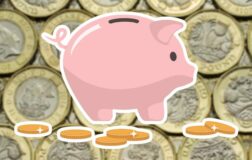 Best tax-free cash ISAs 2022
Best tax-free cash ISAs 2022 Student Money Survey 2014 – Results
Student Money Survey 2014 – Results How much money should your parents give you for university?
How much money should your parents give you for university? 11 free things you can get from university
11 free things you can get from university
Free money cheat sheet!
Continue
Weekly deals, guides + free cheat sheet. Privacy policy
Comments
Ask us a question or share your thoughts!
Tweet @savethestudent – Facebook Message – Email ShareTweet
Next ArticleHow does the stock market work?

the student money website
Save the Student provides free, impartial advice to students on how to make their money go further.
Contact usRECENT POSTS
Which universities are the easiest to get into?
19 May 2022
19 May 2022
14 skills to help you survive university
18 May 2022
Cheap ways to keep cool in the heat
18 May 2022
STUDENT PICKSStudent money cheat sheet
Disclaimer: All content on this website is based on individual experience and journalistic research. It does not constitute financial advice. Save the Student and its authors are not liable for how tips are used, nor for content and services on external websites. Common sense should never be neglected!
We sometimes use affiliated links which may result in a payment following a visitor taking action (such as a purchase or registration) on an external website. This helps keep Save the Student free. The user experience shouldn’t be any different, and our editorial decision making is not affected by such links.
Privacy Policy – Sitemap – © 2022 Save the Student. All Rights Reserved.Climate Positive Website
Like most sites, we use cookies to optimise your experience and serve personalised content. By using our website you agree to our use of cookies. More info
Win! Deals
- Banking
- All banking & budgeting
- Student banking
- Budgeting advice
- Student money surveys
- Student money podcast
- Save Money
- All save money
- Student deals
- Food & drink
- Travel & holidays
- Health & relationships
- Lifestyle
- Student recipes
- Accommodation
- All accommodation
- Student survey 2021
- Student bills guide
- Rent budget calculator
- Student cities



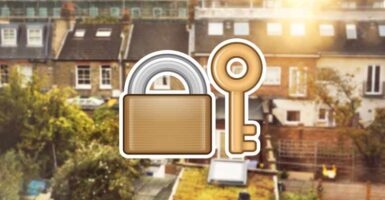

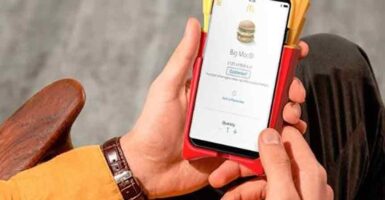

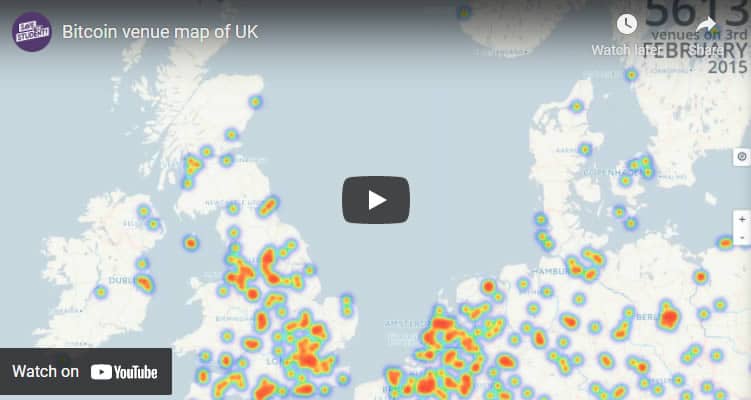
No comments:
Post a Comment